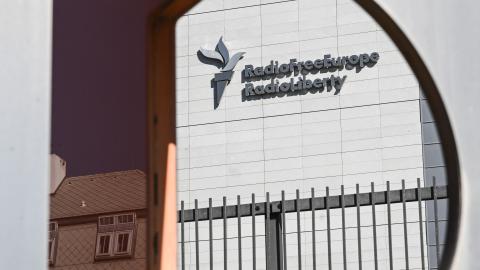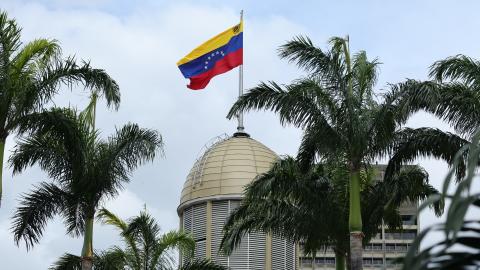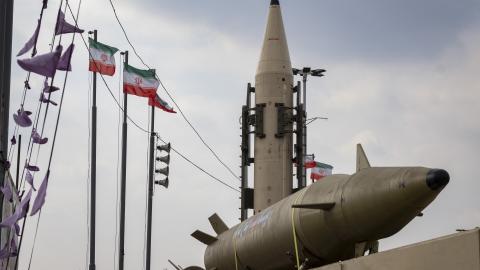Egyptian businessman and human-rights activist Ramy Lakah should be very much on Secretary of State Condoleezza Rice’s mind as she visits Cairo today. The case of this 41-year-old Coptic Christian dramatizes the destructiveness of Hosni Mubarak’s human-rights policies upon a nation that was once the cultural leader in the region and raises some of the steep challenges facing President Bush’s democratization push for the country. But his experience also offers some hope and points a way forward.
Lakah, a business entrepreneur, philanthropist, and social-reformer politician, is a citizen any country would be proud to call its own and one that Egypt desperately needs if it is to develop into a successful democratic state. But, according to Lakah, because of his political success at the expense of the ruling National Democratic party and his criticism of the Mubarak regime’s human-rights record, he has been the target of harassment and a vicious government-smear campaign that has shattered his endeavors inside Egypt and forced him and his family to flee the country.
In 1998, building on a fortune inherited from his father bioengineering business, he formed the Lakah Group, a holding company that employed 12,000 people. Lakah says that international rating agencies gave it the highest bond rating achieved by any Egyptian company until that time. An indomitable mover and shaker, his ambitions did not rest there. He wanted to invest in the people of his native land, as well. Hence, he started micro-enterprises for girls and sponsored educational opportunities in the lower middle class neighborhood of Dahar, in central Cairo.
Lakah’s good works proved so popular that Dahar, which like the country as a whole is about 90-percent Muslim, elected him to parliament in 1999 despite his open identification as a Catholic (he was a principal host of Pope John Paul II during the papal visit to Egypt in 2000). He was popular among his peers in the legislature as well, and they made him the vice chair of the parliament’s powerful foreign-affairs committee.
The Problem of Success
This was the start of Lakah’s troubles. Not only did he defeat the ruling NDP in a seat it had traditionally held in the People’s Assembly, he did so by beating a close relative of the prime minister. Around the same time, he joined the board of directors of the Egyptian Organization for Human Rights and signed his name to a courageous report that found that “torture is practiced in police stations in governorates all over Egypt, from Aswan in the south to Alexandria in the north.”
The Banc du Caire, whose chairman was appointed in 2000 by the prime minister, and other government banks soon began bouncing millions of dollars in checks due to the Lakah Group and employing other forms of financial harassment against the company, according to Lakah. The pressure intensified when he joined with human-rights dissident Ayman Nour to announce their intention to form a new liberal political party, the Al Ghad party.
Next, Lakah, who also holds a French passport, was removed from his elected seat through the selective enforcement of a new measure barring parliamentarians with dual citizenship. The rule was not been applied to other deputies with dual citizenship; one of his colleagues in the assembly, a fellow human-rights advocate who is Muslim, resigned in protest.
The Lakah Group was dealt a major setback after government banks and institutions failed to honor their commitments to it. Lakah himself was subsequently accused of financial wrongdoing, charges that he denies and has tried to counter through international audits.
Acting on a tip that he was about to be arrested, Lakah finally left Egypt in July 2001. Now 41, he lives with his wife and two young daughters in Paris where he is CEO of Star Airlines, a Middle East commercial airlines with offices on the Champs Elysees. Even in exile, he continues to be hounded by the Mubarak government, which Lakah says falsely reported to Interpol that he is wanted on criminal charges though he knows of none that have been lodged against him. In 2003, based on an Interpol warrant, he was subject to a 24-hour detention, followed by deportation, when he landed at Chicago’s O’Hare airport while on a business trip. This is doubly tragic because Lakah is staunchly pro-American and was one of the few Egyptians to respond to the United States government’s call for help by training Iraqis in radiology and other areas of bioengineering.
Lakah is eager to clear his name but holds little hope for a fair trial. The Egyptian judiciary is not known for its independence. His friends and pro-democracy colleagues, Nour and Saad Eddin Ibrahim have both served jail time on trumped up charges in Egypt and were released only because of international pressure.
Egyptians have not had the freedom to change their government. Mubarak has been president for nearly a quarter of a century by standing for office unopposed in four national referendums. The president appoints the country’s 26 governors and may dismiss them at his discretion. The National Democratic party, which has governed since 1978, has used its entrenched position to dominate national politics and has maintained an overriding majority in the People’s Assembly and the upper chamber, the Shura Council. Earlier this year, in response to domestic pressure and President Bush’s explicit calls for democratic elections in Egypt, President Mubarak called for an amendment to the constitution to allow opposition candidates to run. However, candidates must be registered with officially recognized political parties and be approved by the People’s Assembly — thus ensuring Mubarak another six-year term.
Mubarak’s policies have created a situation in which pro-Western democrats like Ramy Lakah are silenced or driven abroad, leaving the Muslim Brotherhood as the only organized opposition within Egypt. If an open election were held this year, few doubt that the Muslim Brotherhood would win. An Islamist group, the Brotherhood has won hearts and minds through charitable work and exploited religion to thrive despite ruthless repression against it. It purportedly renounced violence in the 1970s, but its motto continues to be: “Allah is our objective. The Prophet is our leader. Koran is our law. Jihad is our way. Dying in the way of Allah is our highest hope.” Though some of its members disclaim the group’s agenda and promise moderation, its institutional goal is to rule through a form of sharia (Islamic law) that would suppress women, give second-class dhimmi status to Coptic Christians and other minorities, and impose restrictions on Muslims’ rights to freedom of speech, association, and religion.
Egypt Is Not a Lost Cause
Nevertheless, the Lakah case does provide some bright rays of hope:
Egyptian society is still not rigidly polarized along sectarian lines. It is encouraging that Muslim Egyptians inside and outside parliament gave Lakah, a prominent member of a non-Muslim minority group, solidarity and support.
Public assistance and humanitarian development projects at the neighborhood level have more to do with the deliverer’s popularity than his religious agenda. As Lakah demonstrated, non-Islamist politicians are electable if they deliver the goods for their districts. With the freedom, resources and time to organize politically, they could conceivably be competitive against the more developed Muslim Brotherhood.
Brave leaders who are committed to individual civil and political freedoms exist within Egyptian society. Ramy Lakah can be added to the list of heroic Egyptian dissidents who include Saad Eddin Ibrahim and Ayman Nour — they are the Andrei Sakharovs, Vaclav Havels, and Natan Sharanskys of their day.
Egypt can begin to “show the way toward democracy in the Middle East,” as President Bush urged in the State of the Union, by clearing Ramy Lakah’s name — and by giving him and other pro-freedom candidates, who as Dr. Ibrahim has spelled out are willing “to abide by certain rules of the game,” the political space to participate fully in the democratic process.














